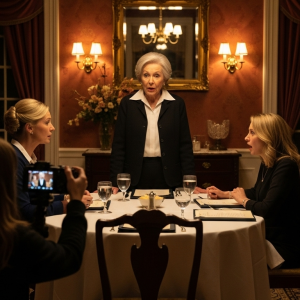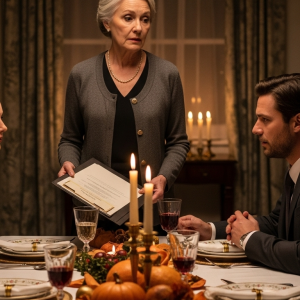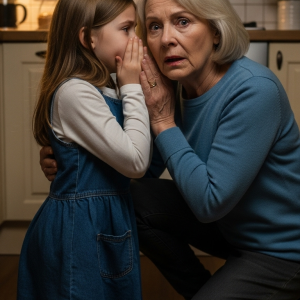The day my son and his wife thought they won $53 million, they kicked me out. “We don’t need your pathetic pension cash anymore,” my daughter-in-law said, her voice dripping with triumph. “Just go die somewhere else.”
They went pale when I laughed. “Sweetheart,” I said, holding up the winning ticket, “did you even bother to read whose name is on it?”
Let me tell you how we arrived at that delicious moment of justice. Three weeks earlier, I was doing what I’d done every Friday for thirty-two years: buying my weekly lottery ticket at Murphy’s Corner Store. My name is Dorothy Williams, but everyone calls me Dot. I’m sixty-seven and, until recently, I was living in what Ashley, my daughter-in-law, liked to call “our guest room.” Guests usually aren’t expected to hand over their entire Social Security check as rent.
The numbers were always the same, a constellation of my life’s most important dates. They were a small, weekly prayer to a past I cherished and a future I hoped would be a little kinder. I never imagined those numbers would one day become a weapon.
The day my husband, Harold, died two years ago, the vultures began to circle. I just didn’t realize one of them was my own son, Marcus.
“Mom, you can’t stay in that big house alone,” he’d said after the funeral, his voice thick with concern I mistook for love. “It’s not practical.” Ashley, his wife, chimed in about the dangers of living alone at my age. The concern in her voice sounded so genuine that I almost believed it.
So I moved into their sprawling colonial home, into the pale-yellow guest room that Ashley promised would be “like a comfortable hotel.” The first month was pleasant enough. I cooked, I cleaned, and I kept to myself. I was grateful for a place to grieve.
By the second month, the requests began. Dot, can you watch the kids? Dot, can you get the dry cleaning? Dot, can you wait for the cable guy? Slowly, I was being transformed from a houseguest into unpaid domestic staff.
By summer, the mask had slipped entirely. Ashley’s requests became demands, and Marcus developed a talent for being conveniently absent during any conflict. The breaking point came when Ashley sat me down for a “talk about the financial arrangement.” She slid a paper across the kitchen table, an itemized list of my “proportional contribution.”
“This seems high,” I said carefully, looking at a total that was exactly $50 less than my entire monthly Social Security check.
“But you’re using the kitchen, the bathroom, the laundry facilities,” she countered, her business-major-speak making it sound official and non-negotiable. “It’s only fair.”
I had no choice but to agree. My other options were a two-year waiting list for senior housing or an apartment in the worst part of town. They had me trapped, and they knew it.
The final humiliation came in November, during one of Ashley’s dinner parties. I’d spent all day cooking and cleaning, then served drinks with a smile plastered on my face. As I was clearing glasses, I overheard Ashley talking to a friend.
“It’s worked out perfectly,” she was saying. “Dot handles all the domestic stuff, watches the kids, and her Social Security covers most of her expenses. It’s like having live-in help, except she pays us for the privilege.”
Her friend laughed. “That’s brilliant. You should write a book: How to Monetize Your Mother-in-Law.”
Standing there with a tray full of dirty glasses, something inside me crystallized. This wasn’t family helping family. This was exploitation, pure and simple. But I said nothing. I just went upstairs and held on to my dignity, and my weekly lottery ticket.
December arrived with Ashley’s announcement that they were converting the basement into a “mother-in-law suite” for me. It was presented as a wonderful upgrade, a way for me to have more “privacy” and “independence.”
“You’ll have your own entrance,” she explained, spreading architectural drawings across the table. “It’s almost like your own apartment.”
They wanted to move me to the basement. They wanted to isolate me completely, to remove the minor inconvenience of my presence from their main living space.
“What if I don’t want to move to the basement?” I asked.
Marcus cleared his throat, looking uncomfortable. “Mom, if you wanted to explore other options, we’d understand.” They knew my other options were non-existent.
That Friday, I walked to the corner store with a new sense of grim determination. I bought my ticket, the familiar numbers feeling less like a prayer and more like a final, desperate plea. As I walked home, I watched Ashley on the phone with the contractor through the kitchen window. “Yes, we need the cheapest options for everything,” she was saying. “It doesn’t need to be fancy. It’s just for one elderly person.”
That’s what I had become. Not Dorothy Williams. Just “one elderly person,” a problem to be managed as cheaply as possible.
The winning numbers were announced that night at 10:59 p.m. I was in bed when I heard them: 7, 14, 23, 31, 45, and Powerball 18. My numbers. My exact numbers. Fifty-three million dollars.
My first instinct was to run downstairs, to share the impossible news. Then I remembered the basement. I remembered the dinner party. I remembered the itemized bill for my existence. I slipped the ticket back into my wallet. Sleep was impossible, but by dawn, I had a plan.
The next morning, Ashley found the ticket while rummaging through my purse for grocery coupons. Her shriek brought Marcus running from his office.
“Oh my god, Marcus, look!” she cried, thrusting the ticket at him. “We won! We won the lottery!” We. The assumption was immediate and absolute.
They paced the kitchen, a whirlwind of shock and elation. They talked about new houses, new cars, and exotic vacations. They even talked about my future.
“We could look into one of those nice senior communities for Dot,” Ashley said, her voice bright with magnanimity. “The expensive ones, with medical care and everything.” The money was already buying them a more elegant way to get rid of me.
I let them dream for a full ten minutes. Then, I spoke into the chaos. “There’s just one small detail we should probably address,” I said quietly.
They both turned, their faces expectant.

“The lottery ticket,” I continued calmly, “is in my name.” The silence that followed was thick with a dawning, horrified realization. “I bought this ticket with my money, from my purse, using the numbers I’ve played for thirty-two years. Which makes the fifty-three million dollars mine.”
The next few days were a masterclass in manipulation. Ashley, in full crisis-management mode, presented me with a three-ring binder filled with articles about lottery winners who went bankrupt.
“The statistics are terrifying,” she said, her face a mask of concern. “Seventy percent go bankrupt within five years! Poor financial decisions, bad investments, family members taking advantage… you need professional guidance, Dot. Family guidance.”
“We don’t want to see you make mistakes that could ruin your financial security,” Marcus added, playing his part.
I let them finish their carefully rehearsed performance. “Ashley,” I said, setting down my coffee cup. “Let me ask you something. Did you research the average cost of assisted living in this area before you set my ‘household contribution’ at thirteen hundred dollars a month?”
Her eyes flickered. “I… what do you mean?”
“Because I did,” I continued. “The average is about eighteen hundred dollars, and it includes meals, housekeeping, and medical support. You’ve been charging me nearly market rate for a guest room while I’ve provided you with over twenty-five thousand dollars a year in unpaid labor. That’s not family helping family. That’s a business arrangement.”
I pushed her binder back across the table. “I think you’re worried about the wrong person making poor financial decisions.”
The news of my win spread through town like wildfire. When reporters showed up at the house, I walked right past Marcus and Ashley and gave my statement on the front lawn.
“I’m very grateful for this blessing,” I told the cameras. “As for my plans, I’m going to use it to live independently and make my own choices for the first time in two years. I’ve been living with my son, paying them rent while providing unpaid domestic services. They were planning to move me to their basement. But now, I have the means to find my own place.”
I looked directly into the camera. “I’m saying that family should be about love and respect, not business arrangements. And it’s never too late to stand up for yourself.” I got in my car and drove away, leaving them to explain that to the evening news.
My next stop was the office of David Richardson, the lawyer Harold and I had used for decades. He congratulated me warmly, then his expression grew serious.
“Dorothy,” he said, “there’s something else. Something Harold made me promise to keep confidential, unless specific circumstances arose.” He opened a thick file. “Circumstances like your family trying to take advantage of you financially.”
The room seemed to tilt. “Harold knew?”
“He was more aware than you realized,” David explained. “He hired a private investigator about six months before he died. He knew they were in significant debt and suspected they were planning to have you move in with them, not out of love, but out of necessity.”
He slid the investigator’s report across the desk. It was all there: $47,000 in credit card debt, an underwater mortgage, Ashley’s business operating at a loss. They had been drowning, and I was their life raft.
“He also wanted you to know about the insurance policy,” David continued gently. “The one he took out specifically for you. Five hundred thousand dollars, paid directly into a trust account in your name. It’s been sitting there, earning interest for two years, waiting for you to need it.”
Harold. My dear, practical Harold. He had been protecting me from beyond the grave. Tears streamed down my face—not of sadness, but of a profound, overwhelming love. He had seen the storm coming and had built me an ark.
“David,” I said, my voice thick but steady. “I want to have a family meeting. Tonight. It’s time Marcus and Ashley learned what happens when you underestimate a Williams woman.”
They arrived at the lawyer’s office thinking they were there to manage the media fallout. They had no idea they were walking into a final reckoning.
I let them begin with their excuses about being “overwhelmed.” Then, I placed the private investigator’s report on the conference table. Marcus went white.
“Your father was worried about you,” I said calmly. “As it turns out, he was right to be.” I laid it all out: their debt, their failing business, the cold, hard numbers of their financial desperation.
“For two years, you’ve been using my Social Security to service your debt while portraying me as a dependent you were generously supporting,” I stated. “That’s not generosity, son. That’s exploitation.”
Ashley began to cry—the tears of someone who’s been caught, not someone who’s sorry.
“But your father knew,” I continued, placing the final document on the table. “This is a trust fund he established for me. Half a million dollars, waiting for me to need it.” I watched the last bit of color drain from their faces.
I stood up, feeling lighter than I had in years. “I’ve put a deposit on a beautiful apartment at the Meadowbrook Senior Community. And since you’ll no longer have my income, you might want to start planning how you’ll manage that forty-seven thousand in credit card debt.”
I paused at the door, looking back at the two people who had taken advantage of my grief for their own gain. “Harold always said that justice delayed isn’t justice denied,” I said. “It’s just justice with better timing.” As I walked out, their crisis was no longer my problem. I had $53 million, a husband who loved me enough to protect me from the afterlife, and the rest of my life to live, finally, on my own terms.




